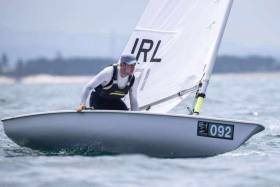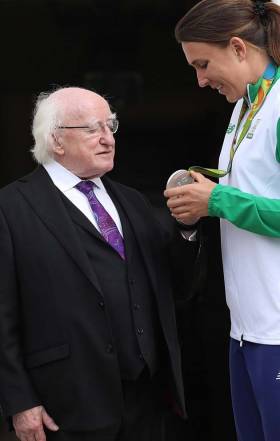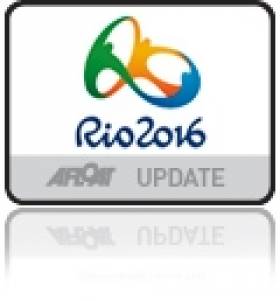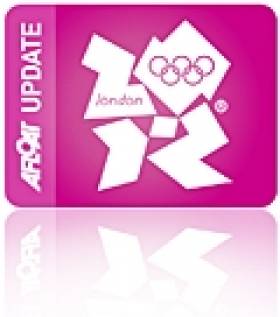Displaying items by tag: olympic sailing team
Irish Olympic Sailing Team In Search of Two Tokyo 2020 Berths
The Irish Olympic Sailing Team have shown the depth of their ambition with the publication of a world-girdling events calendar as they go in search of final Olympic berths for Tokyo 2020.
Ireland is contesting three of ten classes in next Summer's Olympics but after four-year campaigns with some solid results, the sailors have so far only booked a single Tokyo place in the Laser Radial (Women) division.
The team are now close to the last chance saloon and chasing a nation berth in the Laser Standard (Men), and the 49er (Men) and will be on a non-stop tour next season according to the 2020 team calendar (downloadable below). The Worlds in Auckland is the 49er teams second chance to qualify to Tokyo. The event is Genoa is their last chance should they not qualify in Auckland.
Radial
Four women will contest a three regatta trials series for the Radial slot next season to see who will be representing Ireland in Tokyo including 2016 Olympic silver medalist Annalise Murphy, Aoife Hopkins, Aisling Keller, and Eve McMahon. The do or die trials series rules here state when a trial is held the recommendations [for Olympic Nomination] made by Irish Sailing's Olympic Sailing Group 'shall be based solely on the results of the Trial Series'.
49er
The 49ers have their work cut out to qualify a boat for the nation at the 49er World Championships in Auckland next month. Racing starts on 3 December and two Irish teams Ryan Seaton with Seafra Guilfoyle and Robert Dickson and Sean Waddilove are predicted to need at least a top-eight finish to take one of four Olympic berths on offer in the 100-boat fleet. 14 nations in the fleet are seeking those four Tokyo slots. If unsuccessful, then the last chance for Olympic Qualification is next April in Genoa where one single European berth is left.
Laser
Likewise for the Laser Standard men, who missed qualification last year at the Worlds in Japan. Finn Lynch, Ewan McMahon and Liam Glynn have their last chance to qualify for the Olympics at the World Sailing World Cup in Genoa next April but they will be chasing two final places on offer.
The following five European countries, (who have still not qualified their country) all finished ahead of Ireland in Japan so Ireland will have to overhaul all but one of these to win a Tokyo berth in Genoa.
- Slovenia
- Switzerland
- Spain
- Netherlands
- Belgium
It'll be a tough nut to crack especially as both Belgium and Spain beat Ireland at the 2018 World Championships too yet the Italian venue is where Lynch performed so well earlier this season.
The calendar (downloadable below) is provisional and dates may change.
President Michael D Higgins has spoken of his great joy and pride at Annalise Murphy's Olympic silver medal winning achievement. The President's comments came during a speech at a reception for Team Ireland following the 2016 Olympic Games in Brazil.
The National Yacht Club sailor, who was welcomed home at a Civic Reception in Dun Laoghaire last Thursday, was among members of the Olympic Sailing Team who attended Áras an Uachtaráin yesterday.
The President said 'The success of Annalise Murphy was another special moment for Irish sport. We all shared in Annalise’s joy, following her bitter-sweet experience at the London Olympics, and that silver medal was long-awaited and extremely well deserved. I watched her reception to her own club, and young sailor after young sailor spoke of how she was their exemplar'.
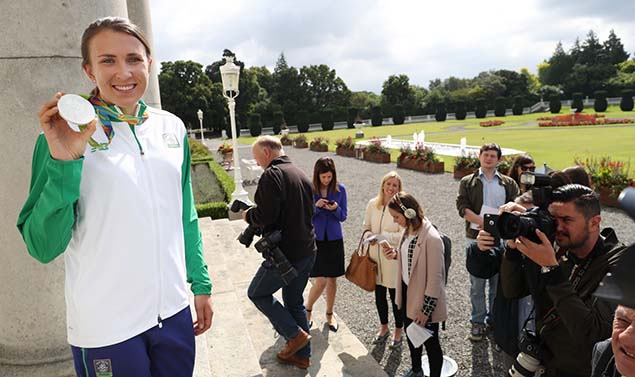 Annalise Murphy poses for a photograph at yesterday's Olympic reception
Annalise Murphy poses for a photograph at yesterday's Olympic reception
 Members of the Olympic Team with the President
Members of the Olympic Team with the President
Irish Sailing Team Condemns Rio's 2016 Olympic Sailing Venue as a 'Health Hazard'
#rio – The Irish Sailing Association (ISA) has condemed the 2016 Olympic regatta venue a 'health hazard'.
According to a report by Johnny Watterson in this morning's Irish Times, the ISA's Olympic chief James O'Callaghan has requested that funding be made available for a doctor to come with them in their next visit to the Rio de Janeiro venue to assess possible health concerns associated with the 'untreated sewage' in the water. More on this story here.
It follows earlier reports on Afloat.ie last December from Irish sailing coach Ian Barker who also slammed the venue.
Other nations have also expressed disgust at the filthy state of the Brazilian waters in which they will race at the 2016 Olympics, with the Irish coach and former British star describing it as a "sewer".
O'Callaghan, who travelled to the venue last Summer believes the health risk to be so significant that the doctor may require all team members on the water to be immunised against a variety of possible infections and illnesses.
Annalise Leads But Van Acker Closes the Gauge
#annalisemurphy – Annalise Murphy remains at the top of the Laser Radial fleet at the Olympic Games tonight but her unbeaten run came to an abrupt halt when strong winds forecast for Weymouth bay failed to materialise.
Instead the 22-year old debutante faced with a new course, new wind direction and placed 8th and 19th today.
With five fleet races left to sail Annalise is on 12 points, Evi Van Acker BEL is next on 14 points and Marit Boumeester NED on 19 and Alyson Young GBR on 23.
Racing was tricky today for most fleets with postponements and recalls. Race 5 for the Laser Radials had to be abandoned and rescheduled for 20 minutes later. Annalise Murphy got off to a good start towards the top of the fleet and rounded the first mark in 8th place. Her position fluctuated slightly throughout the race but ultimately she finished in 8th place while Van Acker (BEL) took first and Young (GBR) took second.
"It was light in areas and strong in other areas on the [race] course and I tried to stay as much as I can in the stronger wind" she told RTE news last night.
Race 6 saw Murphy get off to a great start at the top of the pack but she chose, along with many others, to take the left side of the course. Her rivals veered to the right which, within moments, was clear to be the correct choice and very quickly gained a 50 meter lead. Murphy then had the difficult task of making her way back across the fleet. It cost her 150 meters and left her in 22nd rounding the first mark. She fought hard throughout the rest of the race but just couldn't make up the distance and finished in 19th.
The discard came in to play today for the Radials after the fifth race. This means that Murphy can discard her 19th which still leaves her 1st overall on 12 points. In 2nd place is Evi Van Acker (BEL) on 14 points with Marit Bouwmeester (NED) in 3rd on 19 points. Tomorrow will be a rest day for the fleet. They will sail a further four fleet races on Friday and Saturday with the medal race taking place on Monday, 6th August.
Ryan Seaton and Matt McGovern had a similarly challenging day in the 49er class. They rounded the first mark of Race 5 in 15th place but thanks to some tactical sailing they overtook three of their competitors to finish the race in 12th. Unfortunately Race 6 proved to be their most difficult to date and they finished towards the back of the fleet in 19th. The 49er discard also came in to play today so the pair discount the 19th and now sit 9th overall on the leader board on 41 points. The leaders Outteridge & Jensen (AUS) are on 10 points followed by Burling & Tuke (NZL) on 23 points and Dyen & Christidis (FRA) on 30 points. The 49er class will continue to race tomorrow and still have a further nine races to sail before the medal race.
James Espey also had his third day of racing today in the Laser class. The Laser fleet also had to contend with undoubtedly frustrating postponements and recalls. Espey finished 47th in Race 5 and an improved 42nd in race 6. With his discard he lies 45th overall. The Laser class will also have a rest day tomorrow with racing resuming on Friday.
Today was the rest day for Peter O'Leary and David Burrows and the Star class. The Irish pair remain in 9th overall and resume racing tomorrow.
Racing will continue tomorrow for the Star and 49er. Ger Owens and Scott Flanigan will also make their debut in the 470 class. The Laser Radial and Laser are on a rest day. Sailing action starts at 12 noon in Weymouth.



























